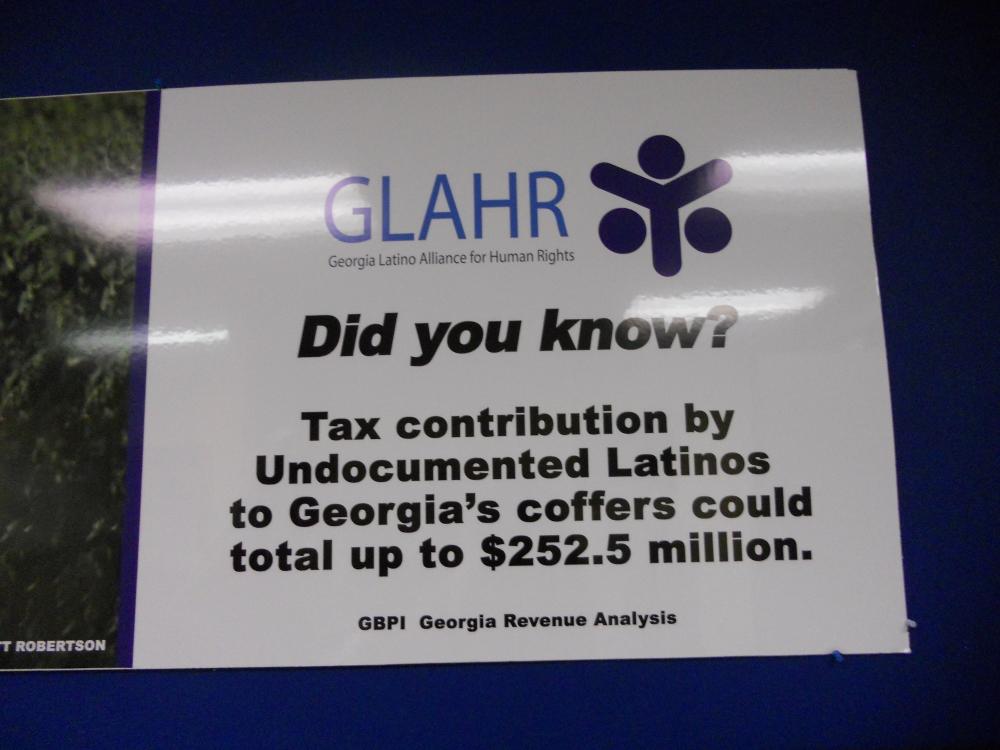
Section Branding
Header Content
Georgia's Other Workforce
Primary Content

The Congressional Budget Office released a report this week that says reforming the nation’s immigration system would cut the deficit and boost the economy. The report focuses on the economic impact of a sector of the workforce that’s also the subject of research by a nonprofit, bi-partisan group in Georgia called The Essential Economy. That group says Georgia’s economy depends on lower-skilled workers, many of whom are undocumented. GPB’s Joshua Stewart and Jeanne Bonner discussed the labor situation in Georgia in an in-studio conversation.
JOSHUA STEWART: So how does the Congressional Budget Office decide immigration reform will help the economy?
JEANNE BONNER: The report looks at the potential impact of passing an immigration reform bill currently being debated by the U.S. Senate. That bill would allow some of the 11 million undocumented residents in the U.S. to stay and start on a path to become citizens. It would also increase the number of visas for both low-skill and high-skill foreign workers.
And the CBO says it would reduce the federal deficit by almost a trillion dollars in the next 20 years because income and payroll taxes would go up.
STEWART: That’s the national picture. Let’s turn now to Georgia and this Essential Economy group. How does what they say mesh with what the CBO found?
BONNER: Both groups are talking about a workforce that’s critical to American productivity. The group here in Georgia is led by two co-chairs who are both former state Senators: Dan Moody, a Republican who’s now on the state DOT board, and Sam Zamarripa, a Democrat, who works in financial services.
And let me tell you how they define The Essential Economy for Georgia. The group says it’s made up of workers in six fields, including poultry processing, agriculture and hospitality. And they say what these workers do contributes to the basic products and services that are essential to everyday life and the overall economy. They estimate one in four workers in Georgia is part of this Essential Economy. And just about half of those people in this workforce are undocumented residents.
Sam Zamarripa, one of the co-chairs, says these workers include maids, cooks, home healthcare aides, landscapers and field hands, etc. And he says it's pretty clear why they are essential.
“Everyone wants a clean glass or a clean dish when we sit at a restaurant," he said in a phone interview. "No one will sleep in a dirty bed if they’re at a hotel. Everyone has high expectations for a clean office. We want our homes built. If we have an elderly parent in a nursing home, we want that person attended to late at night.”
He says business and political leaders focus on the knowledge economy, you know the information workers, the engineers, the finance workers, the computer scientists. But he says there’s a catch.
“You can’t have the computer science industry in Georgia without the essential economy," he said. "So the essential economy is an enabler. It’s inextricable from the successful, larger economy.”
STEWART: How does the illegal immigration crackdown that Georgia lawmakers passed a couple of years ago figure into this?
BONNER: Well, Georgia is one of a handful of states that passed its own immigration law. And since it passed, there’s been a real spotlight on this part of the labor force, in part because many workers fled the state after the bill passed in 2011.
Many of them work in two key sectors: agriculture and hospitality.
I should say, too, that the Essential Economy doesn’t only focus on illegal workers. But they say looking at demographic changes, and the fallout of the state’s immigration law, Georgia doesn’t have a native, ready source of people wanting to work in these fields and so one way or another, the state is going to have to deal with this from a public policy standpoint.
STEWART: So you mentioned the labor issue. How is Georgia’s labor situation right now?
BONNER: Well, it depends on the sector and the geographic location of the companies involved. Officials with both the agriculture and hospitality industries say the labor force has stabilized since the initial period after the immigration law went into effect. But there are shortages.
Officials with the Georgia Fruit and Vegetable Growers Association say some farmers have opted to hire legal foreign workers through a federal guest worker program that uses a visa called H2A. And some farmers in the blueberry sector have begun to grow varieties that can be mechanically harvested.
But anecdotally some of the sources I talk to say the labor situation is dire, particularly in or near counties that work with the federal government on apprehending illegal immigrants. They say it’s very hard to get the workers they need. One farmer I spoke with said he was just never able to hire all the workers he needed in the peak spring harvesting season. That means he really can’t think about expanding because who would do the work?
STEWART: GPB's Jeanne Bonner, thanks.
BONNER: Thank you.
Tags: immigration, workforce, undocumented residents, deficit, The Congressional Budget Office, The Essential Economy, Georgia’s economy, lower-skilled workers
